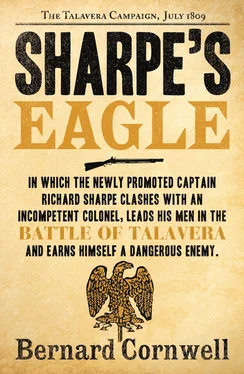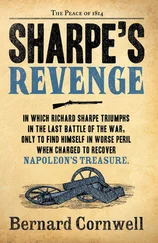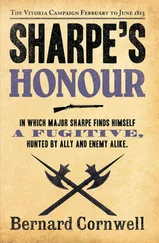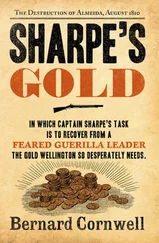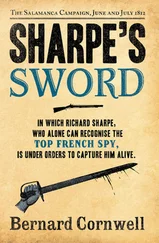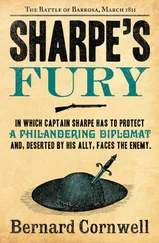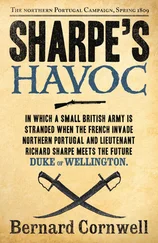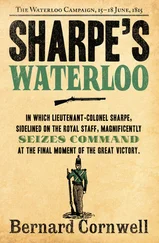But there were much greater events resting on his shoulders than the seizing of an eagle. I had fallen in love with Judy, an American to whom the book is dedicated and who, for family reasons, could not live in Britain, which meant I had to earn a crust in the United States if the course of true love was ever to flow smooth. The American Government, in its Simmerson-like wisdom, refused me a work permit so I airily told Judy that I would support us by writing books. Sharpe had to succeed if that irresponsible promise was to be kept. That was twenty-one years ago, and we are still married, so in truth Sharpe’s Eagle is a dazzling romance. And one day I shall read it again.
In 1809 the British army was divided into Regiments, as today, but most Regiments were described by numbers not by names; thus, for instance, the Bedfordshire Regiment was properly called the 14th, the Connaught Rangers the 88th and so on. The soldiers themselves preferred the names but had to wait until 1881 for their official adoption. I have deliberately not given the South Essex, a fictional Regiment, any number.
A Regiment was an administrative unit; the basic fighting unit was the Battalion. Most Regiments consisted of at least two Battalions but a few, like the imaginary South Essex, were small single-Battalion Regiments. That is why, in Sharpe’s Eagle , the two words are used interchangeably of the South Essex. On paper a Battalion was supposed to have about a thousand men but disease and casualties, plus the shortage of recruits, meant that Battalions often went into battle with only five or six hundred troops.
All Battalions were divided into ten companies. Two of these, the Light Company and the Grenadier Company, were the elite of the Battalion and the Light Companies, in particular, were so useful that whole Regiments of Light troops, like the 95th Rifles, were being raised or expanded.
A Battalion was usually commanded by a Lieutenant Colonel, with two Majors, ten Captains, and below them the Lieutenants and Ensigns. None of these officers would have received any formal training; that was reserved for officers of the Engineers and the Artillery. About one officer in twenty was promoted from the ranks. Normal promotion was by seniority rather than merit but a rich man, as long as he had served a minimum period in his rank, could buy his next promotion and thus jump the queue. This system of purchase could lead to very unfair promotions but it is worth remembering that without it Britain’s most successful soldier, Sir Arthur Wellesley, later the Duke of Wellington, would never have risen to high rank early enough in his career to form the most brilliant army Britain has ever possessed; the army in which Richard Sharpe fought the French through Portugal, Spain, and into France between 1808 and 1814.
The guns could be heard long before they came into sight. Children clung to their mothers’ skirts and wondered what dreadful thing made such noises. The hooves of the great horses mixed with the jangling of traces and chains, the hollow rumbling of the blurring wheels, and above it all the crashes as tons of brass, iron and timber bounced on the town’s broken paving. Then they were in view; guns, limbers, horses and outriders, and the gunners looked as tough as the squat, blackened barrels that spoke of the fighting up north where the artillery had dragged their massive weapons through swollen rivers and up rain-soaked slopes to pound the enemy into oblivion and defeat. Now they would do it again. Mothers held their smallest children and pointed at the guns, boasted that these British would make Napoleon wish he had stayed in Corsica and suckled pigs which was all he was fit for.
And the cavalry! The Portuguese civilians applauded the trotting ranks of gorgeous uniforms, the curved, polished sabres unsheathed for display in Abrantes’ streets and squares, and the fine dust from the horses’ hooves was a small price to pay for the sight of the splendid Regiments who, the townspeople said, would chase the French clean over the Pyrenees and back into the sewers of Paris itself. Who could resist this army? From north and south, from the ports on the western coast, they were coming together and marching east on the road that led to the Spanish frontier and to the enemy. Portugal will be free, Spain’s pride restored, France humbled, and these British soldiers can go back to their own wine-shops and inns leaving Abrantes and Lisbon, Coimbra and Oporto in peace. The soldiers themselves were not so confident. True they had beaten Soult’s northern army but, marching into their lengthening shadows, they wondered what lay beyond Castelo Branco, the next town and the last before the frontier. Soon they would face again the blue-coated veterans of Jena and Austerlitz, the masters of Europe’s battlefields, the French Regiments that had turned the finest armies of the world into so much mincemeat. The townspeople were impressed, at least by the cavalry and artillery, but to experienced eyes the troops gathering round Abrantes were pitifully few and the French armies to the east threateningly big. The British army that awed the children of Abrantes would not frighten the French Marshals.
Lieutenant Richard Sharpe, waiting for orders in his billet on the outskirts of town, watched the cavalry sheath their sabres as the last spectators were left behind and then he turned back to the job of unwinding the dirty bandage from his thigh.
As the last few inches peeled stickily away some maggots dropped to the floor and Sergeant Harper knelt to pick them up before looking at the wound.
‘Healed, sir. Beautiful.’
Sharpe grunted. The sabre cut had become nine inches of puckered scar tissue, clean and pink against the darker skin. He picked off a last fat maggot and gave it to Harper to put safely away.
‘There, my beauty, well fed you are.’ Sergeant Harper closed the tin and looked up at Sharpe. ‘You were lucky, sir.’
That was true, thought Sharpe. The French Hussar had nearly ended him, the man’s blade half way through a massive down-stroke when Harper’s rifle bullet had lifted him from the saddle and the Frenchman’s grimace, framed by the weird pigtails, had turned to sudden agony. Sharpe had twisted desperately away and the sabre, aimed at his neck, had sliced into his thigh to leave another scar as a memento of sixteen years in the British army. It had not been a deep wound but Sharpe had watched too many men die from smaller cuts, the blood poisoned, the flesh discoloured and stinking, and the doctors helpless to do anything but let the man sweat and rot to his death in the charnel houses they called hospitals. A handful of maggots did more than any army doctor, eating away the diseased tissue to let the healthy flesh close naturally. He stood up and tested the leg. ‘Thank you, Sergeant. Good as new.’
‘Pleasure’s all mine, sir.’
Sharpe pulled on the cavalry overalls he wore instead of the regulation green trousers of the 95th Rifles. He was proud of the green overalls with their black leather reinforcement panels, stripped from the corpse of a Chasseur Colonel of Napoleon’s Imperial Guard last winter. The outside of each leg had been decorated with more than twenty silver buttons and the metal had paid for food and drink as his small band of refugee Riflemen had escaped south through the Galician snows. The Colonel had been a lucky kill; there were not many men in either army as tall as Sharpe but the overalls fitted him perfectly and the Frenchman’s soft, rich, black leather boots could have been made for the English Lieutenant. Patrick Harper had not been so fortunate. The Sergeant topped Sharpe by a full four inches and the huge Irishman had yet to find any trousers to replace his faded, patched and tattered pair that were scarcely fit to scare crows in a turnip field. The whole company was like that, reflected Sharpe, their uniforms threadbare, their boots literally tied together with strips of hide, and as long as their parent Battalion was home in England Sharpe’s small company could find no Commissary Officer willing to complicate his account books by issuing them with new trousers or shoes. Sergeant Harper handed Sharpe his uniform jacket. ‘Do you want a Hungarian bath, sir?’
Читать дальше
